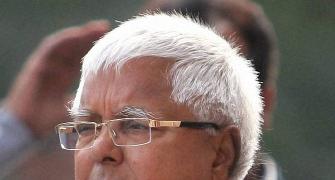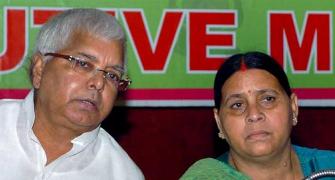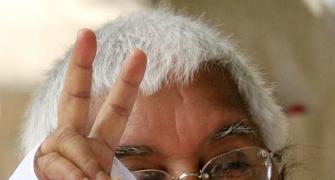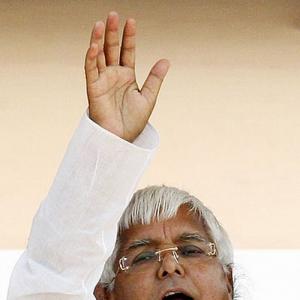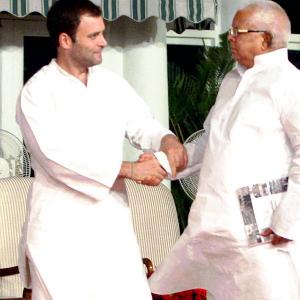 Rumour has it that former Bihar chief minister Lalu Prasad had once misbehaved with Amit Khare, the then district commissioner of Chaibasa in south Bihar, in full public view. The incident was enough to enrage the strong lobby of Indian Administrative Service officers to take on the all-powerful chief minister.
Rumour has it that former Bihar chief minister Lalu Prasad had once misbehaved with Amit Khare, the then district commissioner of Chaibasa in south Bihar, in full public view. The incident was enough to enrage the strong lobby of Indian Administrative Service officers to take on the all-powerful chief minister.
Khare, now a joint-secretary in the ministry of human resource development in New Delhi, denies any such incident took place, but can't help gloating at Prasad's conviction and five-year imprisonment in the infamous fodder scam.
He is, after all, the man who first got a whiff of the scam.
"An officer must do his duty and uphold the law. I was doing my duty," Khare says, seated in his first-floor office inside Shastri Bhavan, a massive and artless structure in the heart of Official Delhi.
Khare joined the IAS in 1985 after completing his graduation from New Delhi's prestigious St Stephen's College and management diploma from the Indian Institute of Management, Ahmadabad. He was allotted the Bihar cadre, but shifted to Jharkhand after the bifurcation of the state in 2001. His IAS batch-mates disclose that Khare is shy and likes to keep to himself.
One batch-mate says that Khare was so shy during the training days that he would never get a date. (He is married to Nidhi, an IAS officer of the 1992 batch who works in the Planning Commission.)
"Since the beginning, he has been very reserved and unassuming. If he passes by, you would hardly register his presence. But to his credit, he is one officer who can quickly sift through hundreds of files and come to the point straightaway," adds another batch-mate.
Perhaps, this ability to quickly see through the files made him smell a rat first. Like other district commissioners, he had received a message from his senior, VS Dubey, on January 22, 1996, seeking details of money withdrawn from the animal husbandry department between November 1995 and December 1995.
There was a scheme to provide cattle for the poorer sections, and these withdrawals were to buy fodder for the cattle. Four days later, and just after the Republic Day holiday, Khare received a report from the Chaibasa treasury. He immediately knew something was amiss. In the months of November and December, Rs 10.12 crore and Rs 9 crore had been withdrawn, respectively.
"When I checked the documents with the treasury, there were many bills of Rs 9.95 lakh. The cap for cash bills was Rs 10 lakh, so the fraudsters deliberately kept the amount at this level. I called the officers for an explanation, but they ran away," he recalls.
Khare says that he then went to the treasury but the people there fled the scene, leaving behind bills, cash, drafts and documents strewn across the floor.
"I sealed the office and shot off my report to the senior officers and the Finance Commission," he says.
In a state like Bihar, taking on politicians and one's superiors is fraught with danger. Khare says he ensured that he submitted his report in writing before these factors could get into play. The report was sealed and he registered three criminal cases at the local police station.
"I was never induced or lured by any of the accused. I never met Prasad after the scam broke," he says.
But this did not save him from intimidating phone calls and punishment postings: he was shunted to the defunct Bihar State Labour Corporation. His journey from Bihar to Jharkhand and to the present wooden-floored office in New Delhi has been a roller-coaster ride, says one of his batch-mates.
"He has suffered due to the fodder scam," says the officer quoted above.


